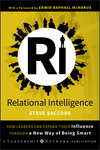RELATIONAL INTELLIGENCE: How Leaders Can Expand Their Influence Through a New Way of Being Smart
 Relational Intelligence: How Leaders Can Expand Their Influence Through a New Way of Being SmartISBN: 978-0-470-43869-5
Hardcover
224 pages
September 2009, Jossey-Bass
This is a Print-on-Demand title. It will be printed specifically to fill your order. Please allow an additional 15-20 days delivery time. The book is not returnable.
Learn more about this book
|
|||||||
RELATIONAL INTELLIGENCE: How Leaders Can Expand Their Influence Through a New Way of Being Smart
Many of us are familiar with the awkward, insensitive, and yet earnest leadership of Michael Scott, played by the clever Steve Carell, on the hit television show “The Office.” While we may chuckle at his ignorance, we often fumble over acknowledging our own shortcomings and how they’re viewed by others. Thought leader Steve Saccone calls this lack of self-awareness the “Michael Scott Syndrome” and suggests the solution is cultivating a new concept called relational intelligence.
While many leaders want to be relationally intelligent, they struggle to understand what it means and how to implement it. In the latest volume in the Leadership Network series, RELATIONAL INTELLIGENCE: How Leaders Can Expand Their Influence Through a New Way of Being Smart (Jossey-Bass, a Wiley Imprint; September 2009; $24.95 / Cloth; ISBN: 978-0-470-43869-5), pastor, speaker, and professor Saccone defines relational intelligence in a clear and provocative way: The “relational” part means learning to see people as the highest value and conveying that to them; the "intelligence” part means learning effective interpersonal skills and then applying them in ways that expand influence.
In RELATIONAL INTELLIGENCE, Saccone unpacks the “Six Defining Roles of a Relational Genius” that are essential to any relationally intelligent leader. They are:
- The Story Collector, who listens and learns
- The Energy Carrier, who sparks people and situations
- The Compelling Relator, who communicates with passion and focus
- The Conversational Futurist, who stays one step ahead
- The Likeable Hero, who evokes favorable feelings and positive outcomes
- The Disproportionate Investor, who develops those who will produce the most good
Saccone criticizes the self-serving, quick-fix, transactional approach to relationships common in many sectors of life – from politics to business to religion to homelife - and encourages the life-changing process of becoming a perceptive and influential leader. By developing this RELATIONAL INTELLIGENCE, leaders can create meaningful dynamics at home, at work, and in community in order to implement true and lasting change. As Saccone so succinctly notes, “Relationships are the human economy and the capital of every leader.”






